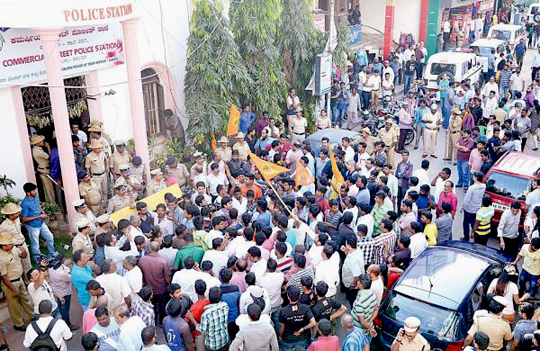Bengaluru: Oct 17: Hundreds of RSS and BJP workers staged a demonstration in front of the Commercial Street police station on Sunday afternoon seeking immediate arrest of those who had hacked RSS?worker Rudresh to death earlier in the day.

After the news of Rudresh's murder spread, hundreds of RSS?and BJP?workers gathered near the police station. Traffic was thrown out of gear as they blocked the road and staged a protest.
The police pacified and dispersed the protesters as their demonstration was hampering vehicular movement. However, the protesters moved to the murder spot and said they would not budge till those behind the murder are arrested. Addressing the protesters, senior BJP?leader R?Ashoka said, “It is testing time for BJP and RSS and we have to remain calm. No one should take law into their hands as this will hamper investigations.”
Over 200 policemen, including Rapid Action Force personnel and Special Weapons and Tactics team and two Commando vehicles, were deployed on Kamaraj Road, Shivajinagar and surrounding areas to ensure that no untoward incidents occur.
Later, Ashoka told reporters that they will besiege the police commissioner's office if no arrests are made by Monday morning. “Since I was home minister, I know how the police work. They are trying to twist the probe by claiming that Rudresh had a few cases against him, which is not true. The police are saying that personal enmity led to his murder, which is also not true.” “During the recent Ganesha festival, Rudresh had installed a Ganesha idol near Shivaji Circle close to Shivajinagar, which no one could do for decades. While he was putting up banners for the festival, members of some other organisations had quarreled with Rudresh. But, it was not brought to the notice of the police as it was a petty issue. On Sunday, a few people enquired with the local residents about the person (Rudresh) who had distributed sweets during the Ganesha Chaturthi,” Ashoka said.
Quoting two of Rudresh's friends who were eye-witnesses to the murder, Ashoka said the assailants were speaking either Hindi or Urdu. However, he said he was not sure of it. Investigating officers said the eyewitnesses including Jayaram claimed that the assailants were speaking Hindi or Urdu and wearing monkey caps. The vehicle had no registration number plate. All these can be confirmed only after the assailants are nabbed, the officers said.
RSS?Bengaluru general secretary K?S?Sreedhar told DH, “We met senior police officers and they told us that they are probing the murder from all angles. On Monday, we will protest near Shivajinagar bus stand condemning Rudresh's murder. He was a sincere RSS and BJP worker. We had never received any complaints against him.” Ashoka said that some six years ago, Rudresh had fought with his neighbour over a petty issue.
Rudresh's sister Vennila said his two children aged six and seven had accompanied him to the RSS Patha Sanchalana. “One of Rudresh's friends had dropped the children at their house. A few minutes later, we got to know that Rudresh was murdered.”
Also Read:





Comments
Why BJP and RSS, they can call either RSS or BJP....they both are same...FAH....
The Cheddi members are decreased... Most of the Dalits and honest hindus now know the tactics of Cheddi deception...
its good for the society.
Add new comment